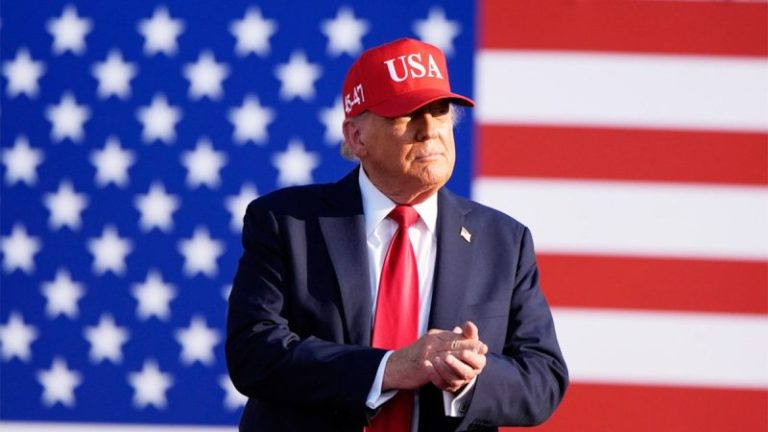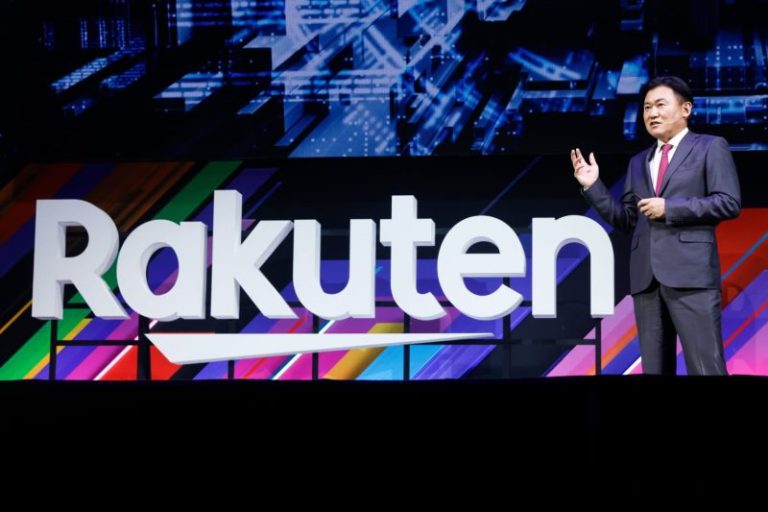President Donald Trump declared that the United States will do ‘whatever it takes’ to win the global race to artificial intelligence dominance, during an address at a summit held in the nation’s capital Wednesday.
‘From this day forward, it’ll be a policy of the United States to do whatever it takes to lead the world in artificial intelligence,’ Trump said during his address shortly ahead of signing three new executive orders that are aimed at boosting the country’s artificial intelligence capabilities.
Meanwhile, Trump also slammed the former Biden administration for ‘weaponizing’ and restricting AI innovation and advancements.
‘If you regulate [AI] too much, you kill the source of American genius and technological power,’ Trump said. ‘I believe that Joe Biden had a plan to lose the AI race. I think he wanted to lose it.’
Administration leaders, including White House Office of Science and Technology policy director Michael Kratsios and AI and crypto czar David Sacks, held a background call with the media Wednesday morning and outlined a three-pillar plan of action for artificial intelligence focused on American workers, free speech and protecting U.S.-built technologies.
‘We want to center America’s workers, and make sure they benefit from AI,’ Sacks said on the call while describing the three pillars.
‘The second is that we believe that AI systems should be free of ideological bias and not be designed to pursue socially engineered agendas,’ Sacks said. ‘And so we have a number of proposals there on how to make sure that AI remains truth-seeking and trustworthy. And then the third principle that cuts across the pillars is that we believe we have to prevent our advanced technologies from being misused or stolen by malicious actors. And we also have to monitor for emerging and unforeseen risks from AI.’
Ending red tape and restrictions on the technology is also a key component of the new AI initiative, administration officials said, noting it will usher in the next ‘industrial revolution.’
Trump ordered his administration in January to develop a plan of action for artificial intelligence in order to ‘solidify our position as the global leader in AI and secure a brighter future for all Americans.’
The presidential action ordered administration leaders to craft a plan ‘to sustain and enhance America’s global AI dominance in order to promote human flourishing, economic competitiveness, and national security’ within 180 days, which was Tuesday.
Kratsios stressed on the Wednesday press call that by cutting federal red tape surrounding AI, American workers will benefit while the U.S. will avoid going down the same AI path as Europe, which is mired in tech regulations, Kratsios said on the call. ‘The action plan calls for freeing American AI innovation from unnecessary bureaucratic red tape, ensuring all Americans reap the benefits of AI technologies and leveraging AI to drive new scientific breakthroughs.’
‘On deregulation, we cannot afford to go down Europe’s innovation-killing regulatory path. Federal agencies will now review their rules on the books and repeal those that hinder AI development and deployment across industries, from financial services and agriculture to health and transportation.’
‘At the same time, we’re asking the private sector to recommend regulatory barriers that they face for the administration to consider removing,’ he added. ‘Instead of cultivating skepticism, our policy is to encourage and enable AI adoption across government and the private sector through regulatory sandboxes and sector-specific partnerships.’
Trump rescinded a Biden-era executive order hours after taking office in January that put restrictions on artificial intelligence technologies, including requiring tech companies to keep the federal government appraised of the most powerful technology they were building before the programs are made available to the public.
Trump’s signature rescinded the Biden order, with a White House fact sheet at the time arguing the Biden executive order ‘hinders AI innovation and imposes onerous and unnecessary government control over the development of AI.’
‘American development of AI systems must be free from ideological bias or engineered social agendas,’ the White House said. ‘With the right government policies, the United States can solidify its position as the leader in AI and secure a brighter future for all Americans.’
‘The order directs the development of an AI Action Plan to sustain and enhance America’s AI dominance, led by the Assistant to the President for Science & Technology, the White House AI & Crypto Czar, and the National Security Advisor,’ the White House said.
The Trump administration has notched massive wins in the artificial intelligence race, which has pitted the U.S. against China to develop the most high-tech artificial intelligence systems, including Oracle and OpenAI announcing Tuesday the companies will further develop the Stargate project, which is an effort to launch large data centers in the U.S. The two companies’ most recent announcement promises an additional 4.5 gigawatts of Stargate data center capacity, a move expected to create more than 100,000 jobs across operations, construction, and indirect roles such as manufacturing and local services.
The Stargate project includes a commitment from OpenAI, Oracle, SoftBank and MGX to invest $500 billion in U.S.-based artificial intelligence infrastructure throughout the next four years.
Creating the data centers is key to the U.S. artificial intelligence race, according to admin officials who spoke on the background call Wednesday. Sacks explained that the administration wants to see U.S. artificial intelligence infrastructure grow by leaps and bounds in order for the country to ‘lead in data centers and in the energy that powers those data centers.’
Earlier in July, Trump traveled to Pittsburgh for an artificial intelligence summit at Carnegie Mellon University while touting the $90 billion in private-sector investments intended to create the Keystone State into an energy and artificial intelligence hub for the country
Trump also has signed other executive orders focused on artificial intelligence as it relates to increasing America’s energy grid capacity, and an April executive order aimed at preparing America’s next generation to employ artificial intelligence through educational programs.
Kratsios said during the call Wednesday that the U.S. winning the artificial intelligence race is ‘non-negotiable,’ citing not only economic and geopolitical considerations.
‘We’re not alone in recognizing the economic, geopolitical, and national security importance of AI, which is why winning the AI race is non-negotiable,’ he said. ‘The plan presents over 90 federal policy actions across three pillars. As David (Sacks) discussed, those are accelerating innovation, building American AI infrastructure, and leading international AI diplomacy and security. The action plan was crafted with overwhelming input from industry, academia and civil society, informed by over 10,000 responses to the White Houses request for information.’
The plan delivered to Trump could be executed in the next six months to a year, according to the background call.
The Trump administration has repeatedly rallied around how artificial intelligence will be crucial at catapulting America into the next ‘industrial revolution,’ which administration officials say will lead to job creation and a strong tech industry that can trounce other nations in the race.
Vice President JD Vance has been one of the most vocal admin leaders touting the U.S. strength on artificial intelligence as it cut red tape surrounding the industry.
‘The Trump administration is troubled by reports that some foreign governments are considering tightening screws on U.S. tech companies with international footprints,’ Vance said in a fiery February speech from Paris. ‘America cannot and will not accept that, and we think it’s a terrible mistake.’
‘At this moment, we face the extraordinary prospect of a new industrial revolution… But it will never come to pass if over-regulation deters innovators from taking the risks necessary to advance the ball,’ he said. ‘Nor will it occur if we allow AI to become dominated by massive players looking to use the tech to censor or control users’ thoughts.’





